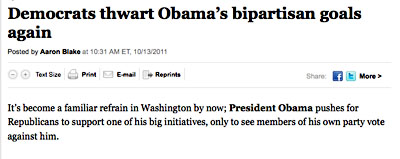James Fallows is once again unhappy over the media’s reporting of Senate dysfunction. Today’s target is a story (and a headline) about the recent jobs bill that, instead of focusing on the fact that all 47 Republicans voted against it, focuses on the fact that a grand total of two (2) Democrats voted against it. There’s unquestionably a fairy tale quality to the piece, especially its fantastical suggestion that those Democratic defections  somehow gave cover to wavering Republicans who were unsure how they were going to vote. That’s just laughable. However, Fallows also registers this complaint about the story:
somehow gave cover to wavering Republicans who were unsure how they were going to vote. That’s just laughable. However, Fallows also registers this complaint about the story:
It reflects so thorough an absorption of the idea that the filibuster-threat is normal business that it describes the latest cloture vote as a vote on the bill itself: “Democratic Sens. Ben Nelson (Neb.) and Jon Tester (Mont.), who are both up for reelection next year, took to the Senate floor and delivered a sizeable blow to the bill’s prospects by voting against it.” No, they voted against the cloture measure, which they knew had zero chance of getting the necessary 60 votes.
Here, I’m on the Post’s side. Like it or not, the reality of congressional politics has changed. The Senate is now a 60-vote body, and it’s the vote on a cloture motion that’s the important vote. For all practical purposes, the cloture vote is the vote on the bill. So my complaint would be just the opposite of Fallows’s. Instead of insisting on a Schoolhouse Rock version of reporting, I’d prefer it if the media routinely reported on the actual reality of legislation today. If you want to report accurately, you should (a) report the cloture vote as a vote on the bill itself, (b) you should make clear that 60 votes are required to pass a bill, and (c) you should report the partisan breakdown of the voting — something that used to be routine but now only occasionally appears in reports of legislative activity.
Bottom line: The real-life practice of politics in America has changed over the past decade. Reporting should change along with it.














